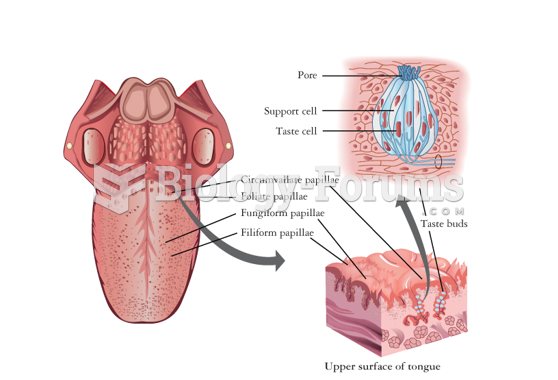Answer to Question 1
Correct Answer: 1,2,3
Rationale 1: Water-soluble drugs may be secreted into the saliva, which can cause a funny taste after the administration of a medication.
Rationale 2: Water-soluble drugs may be secreted into the sweat, which may cause an odor to be omitted by the person who has taken a medication.
Rationale 3: Water-soluble drugs may be secreted into the breast milk. Breast-feeding mothers must use caution in regards to medications while lactating as the medications can be passed to their infants via the breast milk.
Rationale 4: Urine is excreted by the kidneys and does not play a role in glandular activity.
Rationale 5: Feces are excreted by the gastrointestinal system and do not play a role in glandular activity.
Global Rationale: Water-soluble drugs may be secreted into the saliva, which can cause a funny taste after the administration of a medication. Water-soluble drugs may be secreted into the sweat, which may cause an odor to be omitted by the person who has taken a medication. Water-soluble drugs may be secreted into the breast milk. Breast-feeding mothers must use caution in regards to medications while lactating as the medications can be passed to their infants via the breast milk. Urine is excreted by the kidneys and does not play a role in glandular activity. Feces are excreted by the gastrointestinal system and do not play a role in glandular activity.
Answer to Question 2
Correct Answer: 1
Rationale 1: Since the drug is recirculated several times through enterohepatic recirculation, continued effects of the drug may be expected.
Rationale 2: The client should expect to continue experiencing some effects of the drug, but not toxic effects.
Rationale 3: The client might have some side effects of the drug if she has been having them all along, but she should not be told to expect side effects.
Rationale 4: The drug might take several weeks to be totally eliminated from the body.
Global Rationale: Since the drug is recirculated several times through enterohepatic recirculation, continued effects of the drug may be expected. The client should expect to continue experiencing some effects of the drug, but not toxic effects. The client might have some side effects of the drug if she has been having them all along, but she should not be told to expect side effects. The drug might take several weeks to be totally eliminated from the body.







